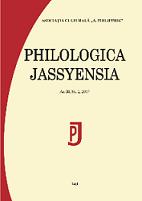Prezenţe spirituale româneşti în spaţiul american. Recuperări necesare
Romanian Cultural Phenomenon in the American Territory
Author(s): Rodica AlbuSubject(s): Literary Texts
Published by: Editura Tracus Arte
Keywords: literature
Summary/Abstract: It could be an exercise of moral responsibility by locating the works of the artists, the writers or the scholars who chose to live outside of Romania in the zone of utmost interest for the Romanian culture. For almost fifty years, during the communism, we were ignoring them (with some exceptions) and even the authors of the dictionaries or histories of literature avoided integrating in the Romanian literature a series of works of the exiled writers. Today, the writers who live(ed) in exile, the Romanian writers living outside the native country are a subject of more and more books39. Writers as Aron Cotruş, Vintilă Horia or Matei Vişniec, Norman Manea, important names of the exile from another age of the Romanian literature, are comprised in The Essential Dictionary of the Romanian Writers, the referrals about them being written by the critic and academic authorities. Some Romanian writers who lived in exile make also the object of a series of monographs and of interesting doctor’s degree theses. Aurel Sasu, one of the authors of the Dictionary of Romanian literature, wrote somewhere that “the Romanian literature is only one in Bucharest, New York, Madrid, Paris or London.” This is the point of view which must be the start for reviewing the Romanian literature, because there is sometimes, let’s admit it, a kind of inertia and lack of concern towards the exile writings, equally blameful like is the opponent tendency, of an enthusiastic recovery which substitutes the aesthetical criterion with a more or less traumatic biographical experience of the exile. After leaving the country after 1945, some Romanians chose France, because of the language and the cultural background, and also Spain. Some of them remained in Europe, others emmigrated again and went to the United States, countries of Latin America or Canada. There, they continued their work as Romanian writers, “moving” the native country to other geography, trying to build in fact their own Romania. They continued to write into Romanian, to edit journals and magazines in Romanian language, to publish books in their own publishing houses etc. One of the most preeminent scholar and writer, Mircea Eliade, in his Memories, said that he didn’t see in exile “a break from the Romanian culture, but only a change of perspective, namely a displacement to diaspora.” So, it is obvious that Mircea Eliade and other Romanian writers (such as Ştefan Baciu, Sanda Golopenţia, Constantin Eretescu, Norman Manea, etc.) continued to feel themselves belonging to the Romanian culture.
Journal: Philologica Jassyensia
- Issue Year: II/2006
- Issue No: 2 (03)
- Page Range: 147-157
- Page Count: 12
- Language: Romanian

